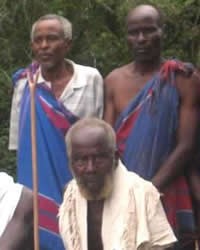Mijikenda, Rabai in Kenya
|
Send Joshua Project a map of this people group.
|
| People Name: | Mijikenda, Rabai |
| Country: | Kenya |
| 10/40 Window: | No |
| Population: | 138,000 |
| World Population: | 138,000 |
| Primary Language: | Kigiryama |
| Primary Religion: | Ethnic Religions |
| Christian Adherents: | 40.00 % |
| Evangelicals: | 13.00 % |
| Scripture: | Complete Bible |
| Ministry Resources: | Yes |
| Jesus Film: | Yes |
| Audio Recordings: | Yes |
| People Cluster: | Bantu, East-Coastal |
| Affinity Bloc: | Sub-Saharan Peoples |
| Progress Level: |
|
Introduction / History
Nine related Bantu tribes live along Kenya's coast near the Sabaki and the Umba Rivers. They are called the Milikenda. One of these related tribes is the Rabai.
What Are Their Lives Like?
Rabai Mijikendas are small-scale farmers, hunters, and gatherers. The crops they plant include perennials such as coconuts and cashews, which are their primary cash crops. They also plant corn, millet, and peas. The Indian Ocean is nearby, so some catch fish.
They can live in extended or nuclear families. Their traditional homes are made of mud with thatched roofs. More recently, they have begun to use iron and bricks to make their homes sturdier.
What Are Their Beliefs?
The Mijikenda were originally idolaters who made sacrifices to their idol. Sacrifices included palm wine, porridge, and blood. They believed that the idols were the representatives of the living dead; they would therefore name the idols after one of their ancestors. They would sacrifice to these wooden images whenever trouble came to their families.
Today, most Mijikendas are Christian, although their ethnic religion remains strong. It's difficult for Mijikenda Christians to turn from their ancestral practices completely.
What Are Their Needs?
The Mijikenda need educational opportunities and adequate medical care.
Prayer Points
Pray for the Mijikendas to give themselves entirely to Christ and live in the power of the Holy Spirit.
Pray for the breaking of ancestral curses.
Pray for the Lord to make an example of the Rabai Mijikendas by blessing them spiritually and economically. They can show others what God can do for those who submit to Christ.
